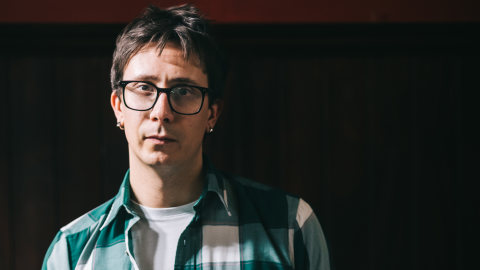From Italy to Ireland to the Screen: The Musical Journey of Composer Martino Vacca MM ’16

Martino Vacca MM '16
Photo courtesy of Martino Vacca
Exactly 10 years ago, composer and arranger Martino Vacca MM ’16 began a new chapter in his career at Berklee Valencia in film scoring and composition. Already an accomplished pipe player in Irish traditional music, the orchestrator and multi-instrumentalist transitioned from a successful performing career to scoring award-winning films and video games.
Vacca’s roots in music trace back to his childhood in Northern Italy, where his father introduced him to traditional instruments like the guitar and Celtic harp. Drawn to Irish culture, he moved to Ireland at age 20 to immerse himself in traditional music. What began as a bold leap turned into years of touring, collaborating, and even becoming the first non-Irish musician to win two senior All-Ireland titles on uilleann pipes.
When his band stopped touring, Vacca seized the moment to pursue his long-held ambition of composing, a path he had once believed was reserved for musicians with more formal training. Enrolling at Berklee Valencia in scoring for film, television, and video games gave him the space to build on his traditional roots and musical skill set to move toward the art of composition. “I had always dreamed of composing, especially for film and video games,” he recalls. “Attending Berklee felt like the natural next step.”
For the composer, great performance begins with great education. “At Berklee, I really grew more in one year than in all the years before. I finally had time to study theory, harmony, composition, and orchestration—not only through classes, but by exchanging knowledge with my peers,” he said. Since then, Vacca has composed award-winning film scores, including Tutto il Tempo che Vogliamo and Mezze Stagioni, which earned him the Premio Machiavelli for Best Soundtrack.
One of Vacca’s biggest breakthroughs came from a chance meeting with the developers of The Lonesome Guild in the hallway of an office building where he was working. That connection ultimately opened the door to one of the most important projects of his career, creating music for the internationally published video game, developed by Tiny Bull Studios and published by DON’T NOD, the worldwide acclaimed French studio behind award-winning hits like Life Is Strange. “The Lonesome Guild was my very first big project. Before this, I did a lot of smaller things—podcasts, indie games, and tons of ghostwriting.”
With 3.27 billion gamers worldwide and revenues projected to hit $236.9 billion in 2025, according to MIDiA Research, the video game industry has become larger than film and music combined, driving unprecedented demand for original soundtracks.
Composing for interactive media requires a different approach than film scoring. While films follow a fixed timeline, games demand flexibility, with music that adapts dynamically to a player’s choices, emotions, and pace of play. For Vacca, the true magic of scoring for video games lies in the creation of music that can actually interact with the game. “You’re negotiating storytelling between the game and the player, meaning that you’re part of the storytelling itself and you’re not trying to convey something that is set in stone but rather express an idea that gets to be part of an active experience,” he explains.
"Storytelling is everything in composition for media. Your own ideas have to be filtered through the story."Martino Vacca MM '16
What drives his composition is a combination of storytelling and adaptability. “Storytelling is everything in composition for media. Your own ideas have to be filtered through the story,” he explains. “And the field keeps evolving, every project is different. Today I might write in one style for a character, tomorrow something entirely new. That change keeps me inspired. After touring for so long and playing the same show every night for years, it’s refreshing to write something different every day as a freelance composer.”
Vacca credits much of his success to his professors at Berklee Valencia while completing his master in Scoring for Film, Television and Video Games. “I honestly think I had the best teachers,” he reflects. “Sergio Jiménez Lacima taught me so much about video game scoring and Alfons Conde was invaluable, brutally honest, sharp, and direct, but always in the best way possible.”
These experiences shaped not only his music but also the advice he now offers to the next generation of aspiring composers. “Don’t rush, and don’t dismiss small jobs. Everything adds up, and you never know what connection or skill will help you later,” he says. “You also need time for yourself, your hobbies, your life. I have two young kids, I do martial arts, I play board games with friends. All of that feeds into who I am as a composer. Be driven, but don’t expect to win an Oscar the year you graduate. Let yourself grow.”
